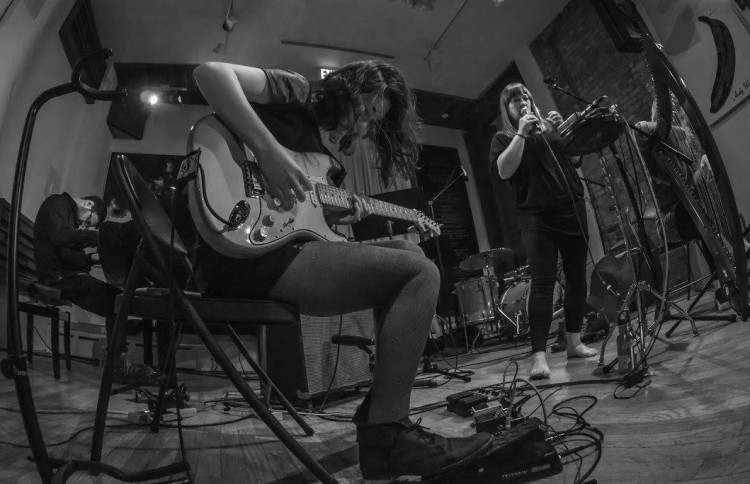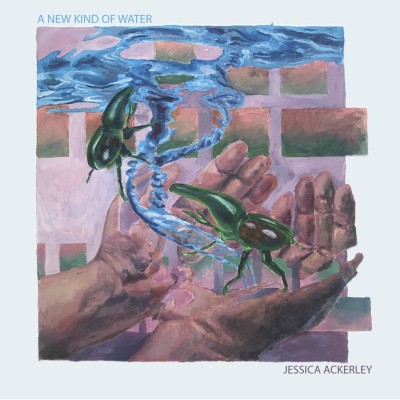![]()
 On August 23, guitarist Jessica Ackerley released A New Kind of Water, a quartet album that features saxophonist Sarah Manning, bassist Mat Muntz and drummer Stephen Boegehold. Recorded at BC Studio in Brooklyn, A New Kind of Water was mixed by homonymous studio founder Martin Bisi. BC Studio has been the studio of choice for a wide variety of projects, from Sonic Youth’s album EVOL to the Herbie Hancock song “Rockit” to work by John Zorn and more. The connective tissue through all of these recordings is a certain kind of gritty aesthetic, a frank musical realism that is reflected – literally, in an acoustic sense – by the cavernous, unfinished walls of the studio’s live room.
On August 23, guitarist Jessica Ackerley released A New Kind of Water, a quartet album that features saxophonist Sarah Manning, bassist Mat Muntz and drummer Stephen Boegehold. Recorded at BC Studio in Brooklyn, A New Kind of Water was mixed by homonymous studio founder Martin Bisi. BC Studio has been the studio of choice for a wide variety of projects, from Sonic Youth’s album EVOL to the Herbie Hancock song “Rockit” to work by John Zorn and more. The connective tissue through all of these recordings is a certain kind of gritty aesthetic, a frank musical realism that is reflected – literally, in an acoustic sense – by the cavernous, unfinished walls of the studio’s live room.
While working with Bisi and recording in BC Studio proved to be integral components of the album, A New Kind of Water is the culmination of years of music-making and career growth. Ackerley has been based in New York since 2011; she first moved to Brooklyn, but now resides in Manhattan. Originally from Alberta, she attended Grant MacEwan University in Edmonton, St. Francis Xavier University in Antigonish, Nova Scotia, and Rutgers University in New Jersey. It was at Rutgers – where she earned a master’s degree, and worked with American jazz luminaries such as Vic Juris and Victor Lewis – that Ackerley started to seriously explore composition. Through multiple residencies at The Banff Centre, she continued to develop her artistic voice, with mentorship from Vijay Iyer, Tyshawn Sorey and Zakir Hussain, amongst others.
 A New Kind of Water is Ackerley’s second full-length album as a leader; her first, Coalesce, was released in 2017. Coalesce – a trio album – also featured bassist Muntz, with Toronto’s Nick Fraser in the drum seat. While Ackerley “didn’t want to do a second album all over again as another trio,” she also “didn’t want to do a strictly quartet record” either, and A New Kind of Water certainly doesn’t feel like a conventional quartet record, in the sense where songs are written as blowing vehicles to fit a particular ensemble. Instead, the ensemble shifts to accommodate the music, both for individual songs and for specific sections within songs. “Space, Frame, Contain,” the album’s opener, begins with a duo between Ackerley and Muntz, with Boegehold and Manning entering later on. This approach to instrumentation is a big part of Ackerley’s interest in exploring the different situations within a single piece of music: ones that “[allow] things to ebb and flow,” to be “added and subtracted,” throughout a piece. Ackerley doesn’t “like the idea of cutting and pasting,” or of “haphazardly patching together” different sections of music, especially sections with varying compositional frameworks (such as a free section and a specifically-notated melodic section). Instead, Ackerley strives to create meaningful, natural connections between musical statements, both on individual songs and throughout her album as a whole.
A New Kind of Water is Ackerley’s second full-length album as a leader; her first, Coalesce, was released in 2017. Coalesce – a trio album – also featured bassist Muntz, with Toronto’s Nick Fraser in the drum seat. While Ackerley “didn’t want to do a second album all over again as another trio,” she also “didn’t want to do a strictly quartet record” either, and A New Kind of Water certainly doesn’t feel like a conventional quartet record, in the sense where songs are written as blowing vehicles to fit a particular ensemble. Instead, the ensemble shifts to accommodate the music, both for individual songs and for specific sections within songs. “Space, Frame, Contain,” the album’s opener, begins with a duo between Ackerley and Muntz, with Boegehold and Manning entering later on. This approach to instrumentation is a big part of Ackerley’s interest in exploring the different situations within a single piece of music: ones that “[allow] things to ebb and flow,” to be “added and subtracted,” throughout a piece. Ackerley doesn’t “like the idea of cutting and pasting,” or of “haphazardly patching together” different sections of music, especially sections with varying compositional frameworks (such as a free section and a specifically-notated melodic section). Instead, Ackerley strives to create meaningful, natural connections between musical statements, both on individual songs and throughout her album as a whole.
These connections are made possible by the trust and rapport between Ackerley and her band, with whom she’s collaborated in a variety of settings. Ackerley has played the music on A New Kind of Water with Muntz as a duo, played a duo set with Manning, and has worked frequently with Boegehold in his project. Having these ongoing working relationships in a variety of settings allows for what Ackerley calls the “magical moments” in a song: “everything lines up, and everyone knows what to do in that moment, and something beautiful comes of it.” It is a sensation that is immediately palpable on A New Kind of Water, and is especially important in music (such as Ackerley’s) with significant sections of free improvisation.
In addition to her busy schedule as a performing musician, Ackerley is also active as a teacher and musical programmer. Amongst other ventures, she recently curated The Brink Guitar Festival, which took place in Brooklyn from March 28 to 31 of this year. Co-presented by Spectrum and Main Drag Music, the festival is a “celebration of the guitar and the musicians in New York City who continue to push its boundaries within the improvised and creative music scene.” The festival grew out of a monthly series at a guitar shop, loose in genre, with the basic format of four 15-minute sets of solo guitar music. With performances from figures such as Miles Okazaki and Dan Weiss, Naeemah Maddox, and Ackerley herself, the festival is part of Ackerley’s work in highlighting the diversity of the guitar at a time when, according to Ackerley, it is “fading from the mainstream, in terms of being a voice at the forefront of musical arrangements and songs.” It’s also part of the ongoing work of creating and fostering community for creative improvised music; as Ackerley puts it, “allowing people to showcase their music in a live setting – and even just seeing improvised music – is a really special thing.”
As the title suggests, one of the overarching themes of the album is a consideration of water. “One of the things that was really important to me in the execution of this album,” Ackerley told me, “was the sense of ebb and flow, and the ability to adjust to any kind of circumstance, whether it be improvisational or compositional.” It is through this process of ebb and flow that Ackerley found an apt metaphor for the way in which each of the band members can find the space to explore their own musical voice within the body of her music. When listeners first come to A New Kind of Water, Ackerley hopes that listeners will consider a “sense of water”: of “a river, or a waterfall, or the ocean,” of water’s “constant movement,” and of the power and tranquility that attends water in its various forms.
Jessica Ackerley’s A New Kind of Water was released on August 23, 2019, and is available for purchase on Bandcamp.
Colin Story is a jazz guitarist, writer, and teacher based in Toronto. He can be reached through his website, on Instagram and on Twitter.



